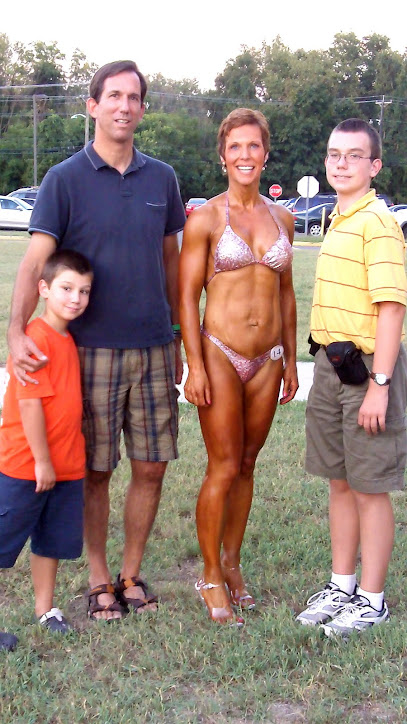At seven weeks before the competition, I realized that I had been training too hard and not eating enough. The combination was leaving me feeling physically tired during the day, unable to sleep well at night, always craving something to eat, and lacking motivation for things I normally like to do (including training). It developed gradually over 2 weeks, and it took me that long to recognize what was happening to me. I imagine that someone else who was not familiar with these symptoms (I discuss the problem of overtraining in one of my courses) might go longer without recognizing them.
A challenge of bodybuilding starting about 12 weeks prior to a competition is figuring out the right balance of diet and exercise to maximize your msucle definition on stage. You need to train to maintain the msucle you've built, but you also need to reduce your body fat to make the muscles more visible. I am learning that it's a delicate balance and that everyone's body is different. Another bodybuilder's diet and training plan at this stage might work well for him or her, but not for you, even if he or she is the same gender and similar to you in size and age.
At about 9 weeks before competition, I had decided to slowly begin to reduce my carbohydrate intake and overall calories. I had been eating 2,200 calories per day and ended up dropping to 1,800 per day, although I didn't have a specific calorie goal when I made the change. My fat intake was already very low (less than 20% of my total calories), and I was attempting to eat 130 - 150 grams of protein each day. I use a computerized diet tracking software to minitor these levels. I also changed my training program at that point to two workouts each day instead of one. I did 30 minutes of aerobic training in the morning (before breakfast) and my usual 60 - 80 minutes of resistance training in the afternoon. I was also spending about 20 minutes a day posing.
Looking back, it makes perfect sense to me that I developed overtaining symptoms, but I didn't see it at the time. I think what contributed to this lack of perspective was my fear that I would not be able to lose the amount of body fat I wanted to lose before the competition. At 45 years old and having low estrogen (because of my hysterectomy and cancer treatment), it is harder for me to lose body fat. Now, my current body fat is 19%, which is quite low for any woman and especially one at my age. Many female bodybuilders compete at levels much lower, though, with some of the younger ones getting below 10% body fat. This is not healthy in the long term and isn't my goal. But my fear was that, if they are competing at 10 - 15% body fat, how will I fare at a much higher level?
I learned at least two valuable things from this experience. First, I cannot obsess over numbers. It doesn't matter what my percent body fat measurement is or how it changes; what matters in a competition is how I look (and equally important to me, how healthy I am). It's easy to obsess over numbers as a bodybuilder; we do it concerning bicep size, calorie intake, wieght, body fat, and anything else we can measure. I'm trying to be aware of it when those thoughts creep in and change them to healthier, more positive thoughts. Second, I learned that I really need to be aware of my body and how I am feeling, both mentally and physically, and then respond to what it needs. My body awareness is increasing as a result of this experience. More important, my willingness to take care of my body (and mind), which includes resting and eating enough food, is increasing as I see how important these things are to my success and health.
Friday, July 23, 2010
Subscribe to:
Post Comments (Atom)






No comments:
Post a Comment